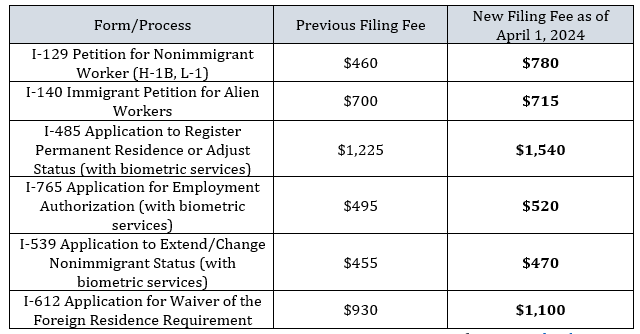
Samantha Wolfe
By Sarah Bileti and Samantha Wolfe
United States Citizenship and Immigration Services (USCIS) made several noteworthy announcements this week regarding H-1B cap registration timing, the expansion of online filings, and fee increases for immigration and naturalization benefit requests.
FY 2025 H-1B Cap Initial Registration Period & Online Filing
USCIS confirmed that the initial H-1B cap registration period for the FY 2025 cap will open at noon Eastern on March 6, 2024, and run through noon Eastern on March 22, 2024. In addition, on February 28, 2024, USCIS will launch new organization accounts in the USCIS online portal. This enhancement will allow collaboration between multiple employer representatives and their external legal teams in preparing and submitting H-1B cap registrations and H-1B petitions and associated requests for premium processing. USCIS will begin accepting electronically filed non-cap H-1B petitions and associated requests for premium processing on February 28, 2024, and cap subject H-1B petitions for beneficiaries selected in this year’s cap lottery on April 1, 2024. While electronic filing will become available as of these dates, petitioners will continue to have the option to file paper H-1B petitions if they prefer. Dependent applications will not be eligible for electronic filing.
USCIS Published a Final Rule Adjusting Fees
For the first time since 2016, USCIS published a final rule on January 30, 2024, adjusting certain immigration related fees, stating that these increases will cover a greater share of the agency’s operating costs and support more efficient processing of applications. According to the final regulation, the “fee rule is not intended to reduce or limit immigration. These fee adjustments reflect DHS’s best effort to balance access, affordability, equity, and benefits to the national interest while providing USCIS with the funding necessary to maintain adequate services.” The new fees, some of which are highlighted in the chart below, will go into effect on April 1, 2024.

Reference: Federal Register
Fee adjustments were first proposed by the Biden administration in 2023 to address a shortfall in USCIS funding. The proposed rule contained overall weighted fee increases of approximately 40% that primarily fell to petitioning employers. In response to criticism from several industry sectors, the final rule contains slightly lower increases in many categories and provides certain discounts and exemptions for small employers and nonprofits.
Other notable takeaways from the final rule include:
- The H-1B cap registration fee of $10 will remain in effect for 2024 but will increase to $215 in 2025.
- Fee increases for individual filers are limited to no more than 26%, consistent with increases in the Consumer Price Index since December 2016. Some critics view the final rule as a tax on businesses, as the costs for petitioning for employment-based visas went up by as much as 201% in some instances.
- The final rule provides for a standard $50 discount in filing fees for online submissions where available.
- Biometrics services costs are incorporated into the main benefit fee for most forms.
- Special fee discounts are provided for non-profits and small employers with less than 25 employees.
- The premium processing timeframe is revised from calendar days to business days.
In addition to the above, the final rule also implements a $600 asylum program fee on I-129, I-129CW, and I-140 petitions. The regulation states that “the Asylum Program Fee is an effective way to shift some costs to requests that are generally submitted by petitioners who have more ability to pay,” as opposed to shifting those costs to all other fee payers. This is another example of the final rule transferring costs and implementing higher fee increases on employer-sponsored petitions that also elicited significant public comment. In response, DHS noted in the final rule that it sought to balance beneficiary-pays and ability-to-pay principles by exempting non-profits from the Asylum Program Fee and reducing it by half for small employers with less than 25 full time employees.
Need for Legal Guidance
Navigating the H-1B cap registration process and other employment-related immigration benefit requests requires a thorough understanding of immigration laws and requirements. Particularly given frequent changes, companies should seek counsel from experienced immigration attorneys.
